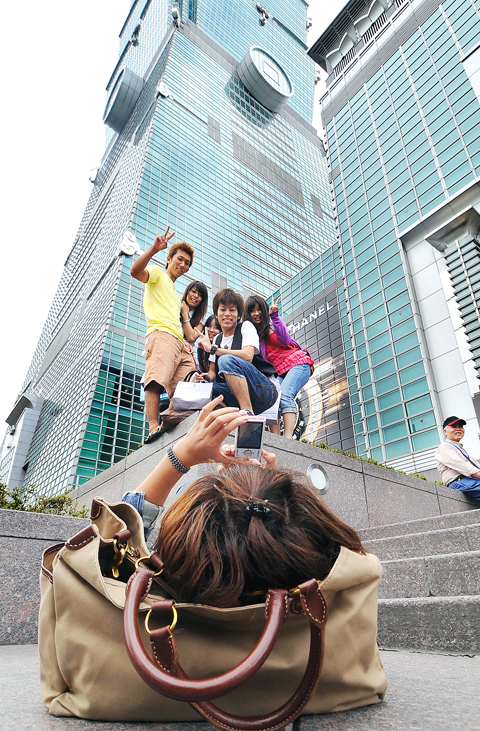A Chinese company is planning to send 9,500 of its employees and their family members to Taiwan on a sightseeing tour later this month, but they will not visit southern Taiwan, Taiwanese officials said.
Officials from the National Immigration Agency (NIA) and the Tourism Bureau said yesterday that the tourists from Beijing’s Pro-Health company would be divided into seven groups, the first of which would arrive in Taiwan via Hong Kong on Oct. 30.
The groups will have a choice of two tours during their seven-day visit, the itinerary Pro-Health sent to the Tourism Bureau and NIA said.

PHOTO: LIAO CHEN-HUEI, TAIPEI TIMES
One tour would take the visitors to central Taiwan immediately after arriving at Taiwan Taoyuan International Airport. They would then travel to Taipei before heading home.
The second choice would allow the tourists to first visit Taipei, then drive to central Taiwan where they would visit Sun Moon Lake and other tourist attractions.
The travel plans do not include southern Taiwan, the officials said without giving a reason for the exclusion. In March, when more than 10,000 employees and sales representatives of the Chinese branch of the international marketing company Amway came to Taiwan on a cruise, they did not visit southern Taiwan either.
At the time, the company said the groups only had only three days to tour Taiwan, so it would be impractical to include Kaohsiung Harbor in the itinerary.
Southern Taiwan is known to be a stronghold of the pro-independence Democratic Progressive Party.

Taiwanese can file complaints with the Tourism Administration to report travel agencies if their activities caused termination of a person’s citizenship, Mainland Affairs Council Minister Chiu Chui-cheng (邱垂正) said yesterday, after a podcaster highlighted a case in which a person’s citizenship was canceled for receiving a single-use Chinese passport to enter Russia. The council is aware of incidents in which people who signed up through Chinese travel agencies for tours of Russia were told they could obtain Russian visas and fast-track border clearance, Chiu told reporters on the sidelines of an event in Taipei. However, the travel agencies actually applied

Japanese footwear brand Onitsuka Tiger today issued a public apology and said it has suspended an employee amid allegations that the staff member discriminated against a Vietnamese customer at its Taipei 101 store. Posting on the social media platform Threads yesterday, a user said that an employee at the store said that “those shoes are very expensive” when her friend, who is a migrant worker from Vietnam, asked for assistance. The employee then ignored her until she asked again, to which she replied: "We don't have a size 37." The post had amassed nearly 26,000 likes and 916 comments as of this

US President Donald Trump said "it’s up to" Chinese President Xi Jinping (習近平) what China does on Taiwan, but that he would be "very unhappy" with a change in the "status quo," the New York Times said in an interview published yesterday. Xi "considers it to be a part of China, and that’s up to him what he’s going to be doing," Trump told the newspaper on Wednesday. "But I’ve expressed to him that I would be very unhappy if he did that, and I don’t think he’ll do that," he added. "I hope he doesn’t do that." Trump made the comments in

New measures aimed at making Taiwan more attractive to foreign professionals came into effect this month, the National Development Council said yesterday. Among the changes, international students at Taiwanese universities would be able to work in Taiwan without a work permit in the two years after they graduate, explainer materials provided by the council said. In addition, foreign nationals who graduated from one of the world’s top 200 universities within the past five years can also apply for a two-year open work permit. Previously, those graduates would have needed to apply for a work permit using point-based criteria or have a Taiwanese company